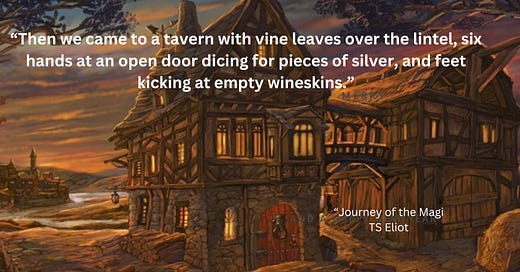This stanza of TS Eliot’s “Journey of the Magi” is rich in Biblical allusions. The vine leaves are a reference to Jesus as the vine (John 15:1-7) while the lintel reminds the reader of the blood spread on the doors of the Israelites, allowing the Angel of Death to pass over their houses (Exodus 12). In this passage, the Magi stand on the threshold of conversion. The choice is clearly theirs: to step in, or to stay out. It is a choice we each make on our own.
It has been a painful journey for the Magi, arduous and long. But the journey has been one of purification, required as they shed the entrapments of their former lives and enter into the Kingdom. While Eliot continued to maintain he had no “conversion experience”, it is clear from his poetry that the ideas were fermenting in his mind for years. In The Four Quartets (1943 ), he wrote:
Dry the pool, dry concrete, brown edged,
And the pool was filled with water out of sunlight,
And the lotos rose, quietly, quietly,
The surface glittered out of heart of light.
This is a lovely illustration of both the Magi and Eliot on the edge of conversion, moving from the “dry pool” into running water.
The last lines of this passage are also a foreshadowing of the end of the story: Judas’ betrayal of Jesus for 30 pieces of silver (Matthew 26:15), the parable of the wineskins (Matthew 9:14), and the soldiers dicing for the Robe of Jesus (Matthew 27:35).
The care of a chronically ill spouse ends in one of two ways: recovery or death. 70% of marriages with an ill spouse end in divorce. As Ron’s ongoing illnesses continued to steal him physically and mentally, I was forced to see the likelihood of his death. In those hours after his funeral, when the family had all gone home, I knelt by my rocking chair and said, “Thank God, it is finally over.” Four years later, and I am still not sure if I was thanking God for the end of the horrible day, or the end of my years as a spousal caregiver.
REFLECTION:
It is not easy to contemplate the death of a loved one. It was not until after my husband died that I became familiar with the term, “anticipatory grief.” In a way, it helped prepare me for what was to come, a foreshadowing of my future as a widow. What has helped you to see or accept an inevitable end? How has it strengthened you?





I went through something similar for several years, but especially last year. I came home after three months in hospital after a complicated fracture. My husband could be alone during those months, thanks to the few hours of daily help of an assistant and the regular visits of home nurses. I could not care for him, but we were home together for four months before the home nurse realized he needed more help. Two months later, the end came as a relief after severe complications of several diagnoses. During those four months when we were both at home, I checked if he was breathing nearly every night. I think he, too, was aware of the end coming closer. Still, it has taken me over a year to grasp my new status - a widow. I miss him more now than during the first year after his death. I am still able to live alone at home (with assistance) despite my debilitating arthritis and continue revising my memoir. I finished the rough draft the week after he died,
Anticipatory grief is a gift, I believe. When my late husband was diagnosed with stage 4 pancreatic cancer, I knew I would soon be a widow. So, when that day came one late December morning, I was ready. A year earlier, when his son, my stepson, died in an automobile accident we were not prepared. I watched how days turned into weeks and into months as Pat tried to assimilate a new reality. In a way, I believe it made his cancer prognosis easier for him, knowing he would soon be with his son.
Thank you for writing about hard things.